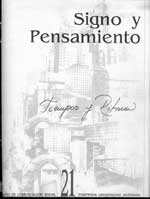Abstract
Encuentro de dos mundos ha sido la relativamente feliz expresión que se encontró para desembarazarse del eurocéntrico descubrimiento.. No quiero que se crea que seseo revivir la polémica ya conocida por todos acerca de la celebración del quito centenario del descubrimiento. Sabemos bien que desde la primera mitad de los ochenta se crearon comisiones nacionales en España y América Latina, como también en Italia, para preparar el año conmemorativo. Numerosas comisiones y comités empezaron a preparar revistas y folletos sobre el aniversario en 1992, en América solamente Canadá y Brasil no participaron en ellos, o sólo lo hicieron marginalmente. Al principio fue el gobierno Cubano el único crítico frente a la euforia que comenzaba a extenderse por iniciativa oficial de los países citados. Cuba lanzo la tesis del exterminio, la explotación y la violación desde hace 500 años. España e Italia hablaban al modo tradicional europeo de 500 años de historia del descubrimiento de América, con Cristóbal Colón como figura central. Estados Unidos, Haití, republica Dominicana centraron sus preparativos en la persona de Colon, relegando el significado histórico a un segundo plano. México hablaba rechazando expresamente el con concepto de descubrimiento, de “encuentro de dos culturas”This journal is registered under a Creative Commons Attribution 4.0 International Public License. Thus, this work may be reproduced, distributed, and publicly shared in digital format, as long as the names of the authors and Pontificia Universidad Javeriana are acknowledged. Others are allowed to quote, adapt, transform, auto-archive, republish, and create based on this material, for any purpose (even commercial ones), provided the authorship is duly acknowledged, a link to the original work is provided, and it is specified if changes have been made. Pontificia Universidad Javeriana does not hold the rights of published works and the authors are solely responsible for the contents of their works; they keep the moral, intellectual, privacy, and publicity rights.
Approving the intervention of the work (review, copy-editing, translation, layout) and the following outreach, are granted through an use license and not through an assignment of rights. This means the journal and Pontificia Universidad Javeriana cannot be held responsible for any ethical malpractice by the authors. As a consequence of the protection granted by the use license, the journal is not required to publish recantations or modify information already published, unless the errata stems from the editorial management process. Publishing contents in this journal does not generate royalties for contributors.


